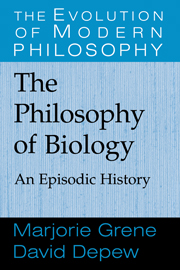Book contents
- Frontmatter
- Contents
- List of Figures
- Notes on Citations and References
- Acknowledgments
- Preface
- 1 Aristotle and After
- 2 Descartes, Harvey, and the Emergence of Modern Mechanism
- 3 The Eighteenth Century I
- 4 The Eighteenth Century II
- 5 Before Darwin I
- 6 Before Darwin II
- 7 Darwin
- 8 Evolution and Heredity from Darwin to the Rise of Genetics
- 9 The Modern Evolutionary Synthesis and Its Discontents
- 10 Some Themes in Recent Philosophy of Biology
- 11 Biology and Human Nature
- 12 The Philosophy of Biology and the Philosophy of Science
- References
- Index
Preface
Published online by Cambridge University Press: 05 June 2012
- Frontmatter
- Contents
- List of Figures
- Notes on Citations and References
- Acknowledgments
- Preface
- 1 Aristotle and After
- 2 Descartes, Harvey, and the Emergence of Modern Mechanism
- 3 The Eighteenth Century I
- 4 The Eighteenth Century II
- 5 Before Darwin I
- 6 Before Darwin II
- 7 Darwin
- 8 Evolution and Heredity from Darwin to the Rise of Genetics
- 9 The Modern Evolutionary Synthesis and Its Discontents
- 10 Some Themes in Recent Philosophy of Biology
- 11 Biology and Human Nature
- 12 The Philosophy of Biology and the Philosophy of Science
- References
- Index
Summary
There would never be, Immanuel Kant assured his readers, a “Newton of a blade of grass.” Living things, he believed, are examples of “natural purposes,” entities organized so purposefully that we cannot explain them altogether through the blind causality we apply to inanimate nature. At the same time, Kant argues that if living beings are organized purposely, or on purpose, rather than just purposefully, we cannot know it. There seems to be something special about things that are alive that exempts them from Newtonian mastery.
Something like this, although not quite in Kantian terms, has been the view of many natural historians, physicians, and comparative anatomists, as well as philosophers, in our tradition. Others, notably Descartes and his followers, as well as more recent “reductionist” thinkers, have denied that any such difference exists.
Yet even among those who stress the uniqueness of life, a number have appeared, at least implicitly, to welcome the accolade of “Newton of a blade of grass,” whether for themselves or others. Georges Cuvier seems to have been happy to assume that title, though it was animals, not plants, that he studied. But he would also have been willing to claim the crown for Master Aristotle. Some thought Cuvier's rival, Etienne Geoffroy Saint-Hilaire, more worthy of that honor. And of course many have since found that it was Charles Darwin who gave the study of life such a new and scientifically satisfying solution that he truly deserved the title “Newton of a blade of grass.”
- Type
- Chapter
- Information
- The Philosophy of BiologyAn Episodic History, pp. xv - xxiiPublisher: Cambridge University PressPrint publication year: 2004

